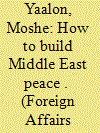| Srl | Item |
| 1 |
ID:
149634


|
|
|
|
|
| Summary/Abstract |
Last May, I resigned from the Israeli government and parliament. I did so largely for reasons of domestic policy, including differences with Prime Minister Benjamin Netanyahu [1] on issues such as respect for the rule of law and the independence of the Supreme Court. National policy toward the Palestinians [2] was not central to my resignation, but it is no secret that I differed on that front as well with some in the government and the Knesset in which I served.
|
|
|
|
|
|
|
|
|
|
|
|
|
|
|
|
| 2 |
ID:
126855


|
|
|
|
|
| Publication |
2011.
|
| Summary/Abstract |
When we talk about Israeli settlement activity in East Jerusalem, we usually mean an activity of one of two types: the large neighborhoods initiated after 1967 by the Israeli government and built on land unilaterally annexed to Jerusalem and expropriated for public needs - i.e., Ramot, Gilo, Pisgat Ze'ev, Har Homa and French Hill. These neighborhoods were set up so that Jewish settlements would encircle East Jerusalem, thus isolating it and separating it from the West Bank, so that East Jerusalem could not serve as the capital of a future Palestinian state. Starting in 1967, successive Israeli governments have undertaken the planning and construction of some 50,000 residential units in these neighborhoods and, today, more than 190,000 Israelis live in them.
|
|
|
|
|
|
|
|
|
|
|
|
|
|
|
|
| 3 |
ID:
170955


|
|
|
| 4 |
ID:
145801


|
|
|
|
|
| Summary/Abstract |
Scholars and pundits believe that Anwar Sadat went to war in October 1973 because Israel left him no choice. The Israeli government rejected his peace proposals during 1971–73, and Sadat initiated the war in order to demonstrate his refusal to agree to the status quo and to the continuation of the Israeli occupation of the territories it occupied in June 1967. However, when the peace treaty signed between Israel and Egypt in March 1979 is carefully studied, it appears the terms of the treaty were in fact much closer to the Israeli position and terms as presented before the 1973 war than to those set by Sadat. Careful reading of the relevant documents in general and Sadat's claims and arguments in particular will show that it was actually Sadat who needed the war, and he needed it not in order to force Israel into a political process, but for himself, so as to accept terms he could not accept without a war.
|
|
|
|
|
|
|
|
|
|
|
|
|
|
|
|